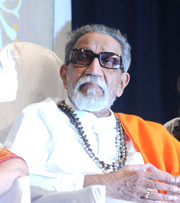Balasaheb Thackeray
| Bal Thackeray | |
|---|---|

Bal Thackeray
|
|
|
In office 19 June 1966 - 17 November 2012 |
|
| Preceded by | Position created |
| Succeeded by | Uddhav Thackeray |
| Personal details | |
| Born |
23 January 1926 Pune, Bombay Presidency, British India (now in Maharashtra, India) |
| Died | 17 November 2012 (aged 86) Mumbai, Maharashtra, India |
| Nationality | Indian |
| Political party | Shiv Sena |
| Spouse(s) | Mina Thackeray |
| Children | Bindumadhav Thackeray Jaidev Thackeray Uddhav Thackeray |
| Parents | Keshav Sitaram Thackeray (father) |
| Profession |
Journalist Cartoonist Political activist |
| Religion | Hinduism |
Bal Keshav Thackeray (Marathi pronunciation: ['ʈʰa:kə'ɾe:]; 23 January 1926 – 17 November 2012) was an Indian politician who founded the Shiv Sena, a Hindu right-wing Marathi ethnocentric party active mainly in the western state of Maharashtra. Holding views attacking Muslims and once praising Adolf Hitler, he was known for his inflammatory writings and was seen as a good orator. A controversial leader, he had a large political influence in the state, especially in Mumbai; his party frequently used violent means against its detractors. Thackeray was blamed for inciting violence against Muslims during the 1992–1993 Bombay riots in the Srikrishna Commission Report, an inquiry by the government.
Thackeray began his professional career as a cartoonist with the English language daily The Free Press Journal in Mumbai, but left it in 1960 to form his own political weekly Marmik. His political philosophy was largely shaped by his father Keshav Sitaram Thackeray, a leading figure in the Samyukta Maharashtra (United Maharashtra) movement, which advocated the creation of a separate linguistic state. Through Marmik, he campaigned against the growing influence of non-Marathis in Mumbai. In 1966, Thackeray formed the Shiv Sena party to advocate for the interests of Maharashtrians in Mumbai's political and professional landscape.
In the late 1960s and early 1970s, Thackeray built the party by forming temporary alliances with nearly all of state's political parties. Thackeray was also the founder of the Marathi-language newspaper Saamana. After the riots of 1992-3, he and his party took a Hindutva stance. In 1999, Thackeray was banned from voting and contesting in any election for six years on the recommendations of the Election Commission for indulging in seeking votes in the name of religion. Besides getting arrested multiple times and briefly going to jail, Thackeray never faced any major legal repercussions for his actions. Upon his death, he was accorded a state funeral with a large number of mourners present. Thackeray did not hold any official position and never was formally elected as the leader of his party.
...
Wikipedia
